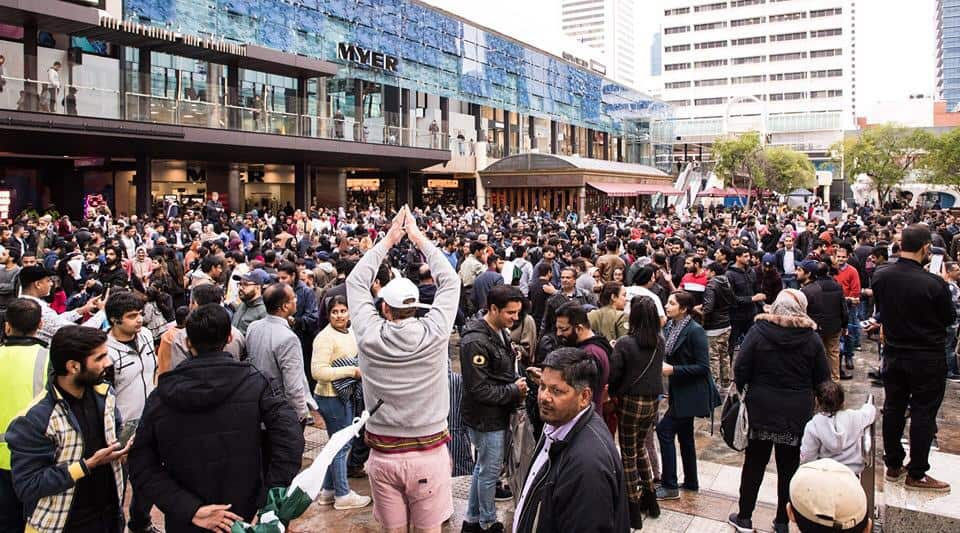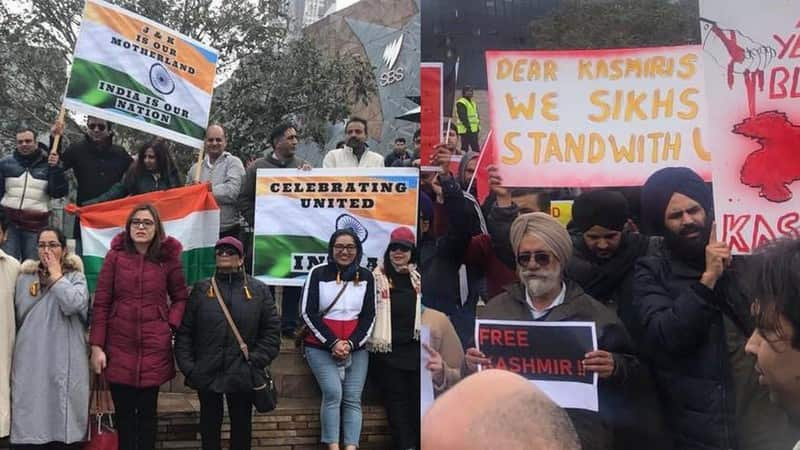The Indian government’s decision to strip Jammu and Kashmir of its special status has divided Australian local communities who have come out in numbers to protest alleged human rights violation in the region, as well as to support India’s move.
The most recent gathering was held over the weekend in Perth's CBD where hundreds of people rallied in support of the people in Kashmir, urging the Indian government to lift the curfew it has imposed in the region for the last four weeks.

The demonstration was attended by academics Dr Atif Malik from UWA and Dr Toni Pikos from Murdoch University, among others.
The speakers urged the Australian government to play a leading diplomatic role by enforcing the 1948 United Nations Security Council Resolution The India-Pakistan Question, which states that the conflict should be resolved in a democratic method by a free and impartial plebiscite.
Muhammad Latif, who represents Islamic Circle of Australia and New Zealand, one of the organising bodies of the Perth protest, told SBS Urdu that the aim of the rally was to support Kashmiri people's right of self-determination, as previously agreed upon by UN resolutions.
“The Australian government should play a role through diplomacy and demand India to act on the UN resolutions,” said Mr Latif.

This comes on the back of multiple demonstrations that have already been held in Sydney and Melbourne.
The Sikh Interfaith Council of Victoria was among the organisations that were present during the Melbourne protest.
Jasbir Singh, Chairman of the Council told SBS Punjabi that "Sikhs have always stood up against injustice and this is no different."
“These protests are not about religion and are more about humanity. Sikhs have always stood up against human injustice and this is what they seem to be doing,” said Mr Singh.

Articulating opposing views, the President of the Kashmiri Pandits Cultural Association in Melbourne termed this a “historic decision”.
Indu Koul told SBS Hindi “The majority of the people from Kashmir like Dogras, Laddkhi, Pandits are happy with what has happened, however, few Kashmiri Muslims are not happy but when [economic] development will happen it will change.”
Human Rights Watch
Human Rights Watch said that the Indian government should ensure the rights of the Kashmiri people were protected by lifting restrictions.
South Asian director, Meenakshi Ganguly at Human Rights Watch said that “Officials should cease using broad, repressive means to curtail the flow of information, or to prevent people from peacefully assembling and expressing their views.”
“Instead of denying human rights violations, Indian authorities should draw lessons from past mistakes, ensure accountability, and act to prevent further abuses,” said Mr Ganguly.
Indian’s Prime Minister Narendra Modi has defended his decision of scrapping Kashmir’s special status saying that it’s a “new era.”
“Article 370 that granted the special status has yielded nothing but separatism, corruption, family rule and was used by Pakistan as a tool to spread terror in the border state,” said Mr Modi.
United Nations Human Rights Report
There have been several reports of human rights violations even before the revocation of Kashmir’s special status.
In July, the Office of the UN High Commissioner for Human Rights released a 43-page report raising serious concerns about abuses by state security forces and armed groups in both Indian and Pakistani parts of Kashmir.
The report found that “since 2016 Indian Security Forces in Indian-administered Kashmir continue to use pellet-firing shotguns as a crowd-control weapon despite a large number of incidental civilian deaths and injuries”.
It also mentioned that the Kashmir region faced barriers to accessing the internet as authorities frequently suspend internet services arbitrarily.
International Media
The recent curfew has put Kashmir in a lockdown with local authorities shutting down all forms of communication including internet, cell phones and landlines. Further restrictions were placed on large public gatherings and demonstrations.
This has caused a significant amount of loss to business and people’s livelihood. It has also led to an information blackout, which has sparked differing opinions on what the current situation on the ground is in the Kashmir valley.
Recent reports by BBC News claimed that security forces in Indian-administered Kashmir were "beating and torturing" people since the crackdown took place. However, the Indian army has rejected these claims by calling them “baseless and unsubstantiated.”
More than 3,000 people including children have been detained by Indian authorities in Kashmir, the Washington Post recently reported, while confirming that at least five Kashmiris younger than 18 have been taken into detention since the start of the crackdown.
The New York Times also reported that more than 2,000 people including Kashmir’s elected leadership are being held in prisons across India without any charges.
It further said, "the Indian officials responded by claiming that the restrictions they have imposed are based on lessons learned from past episodes of unrest in Kashmir when huge anti-government protests degenerated into clashes with security forces that took dozens of lives".
Political Standpoint
A number of Australian and international leaders have expressed concerns over the current situation in Indian-administered Kashmir.
Greens Senator Dr Mehreen Faruqi and leader of the Greens Party Senator Richard Di Natale are concerned that the Indian government’s decision to revoke Kashmir’s special status could further erode their right to self-determination and risks a dangerous escalation of violence.
“The Greens urge the Australian Government to speak out and call on the Indian Government to respect the human rights of the people in Kashmir and their right to self-determination,” said Dr Faruqi and Mr Natale in a statement.
Meanwhile, US presidential candidate Bernie Sanders has also voiced his concerns, saying that India’s actions are unacceptable and that the communications blockade must be lifted immediately.
“The United States government must speak out boldly in support on international and humanitarian law and in support of a UN-backed peaceful resolution that respects the will of the Kashmiri people,” Mr Sanders said while addressing a large crowd in Houston recently.
Furthermore, British MP Phil Bennion said that the EU should consider enforcing sanctions on India if India does not stop human rights violations.
“I don’t take a pro-Pakistan line on this I take a pro-Kashmiri line because Pakistan is not perfect in any sense whatsoever. Pakistan must put its house in order as well as India,” said Mr Bennion.
UN Security Council
Last month the UN Security Council held a closed-door meeting, it's first over the Kashmir issue since 1965. But it failed to come to any conclusion.
Pakistan’s Prime Minister, Imran Khan recently expressed his concerns in an opinion piece in The New York Times stating that “if the world does nothing to stop the Indian assault on Kashmir and its people, there will be consequences for the whole world as two nuclear-armed states get ever closer to a direct military confrontation.”
Kashmir has been a disputed territory between the two countries for the last 72 years, both claiming their right over the territory.
The first resolution on the Kashmir issue was passed by the UN Security Council in1948 termed as ‘The India-Pakistan Question’.
The resolution states that “The restoration of peace and order in Jammu and Kashmir is essential and that India and Pakistan should do their utmost to bring about a cessation of all fighting.”
“Both India and Pakistan desire that the question of the accession of Jammu and Kashmir to India or Pakistan should be decided through the democratic method of a free and impartial plebiscite.”
